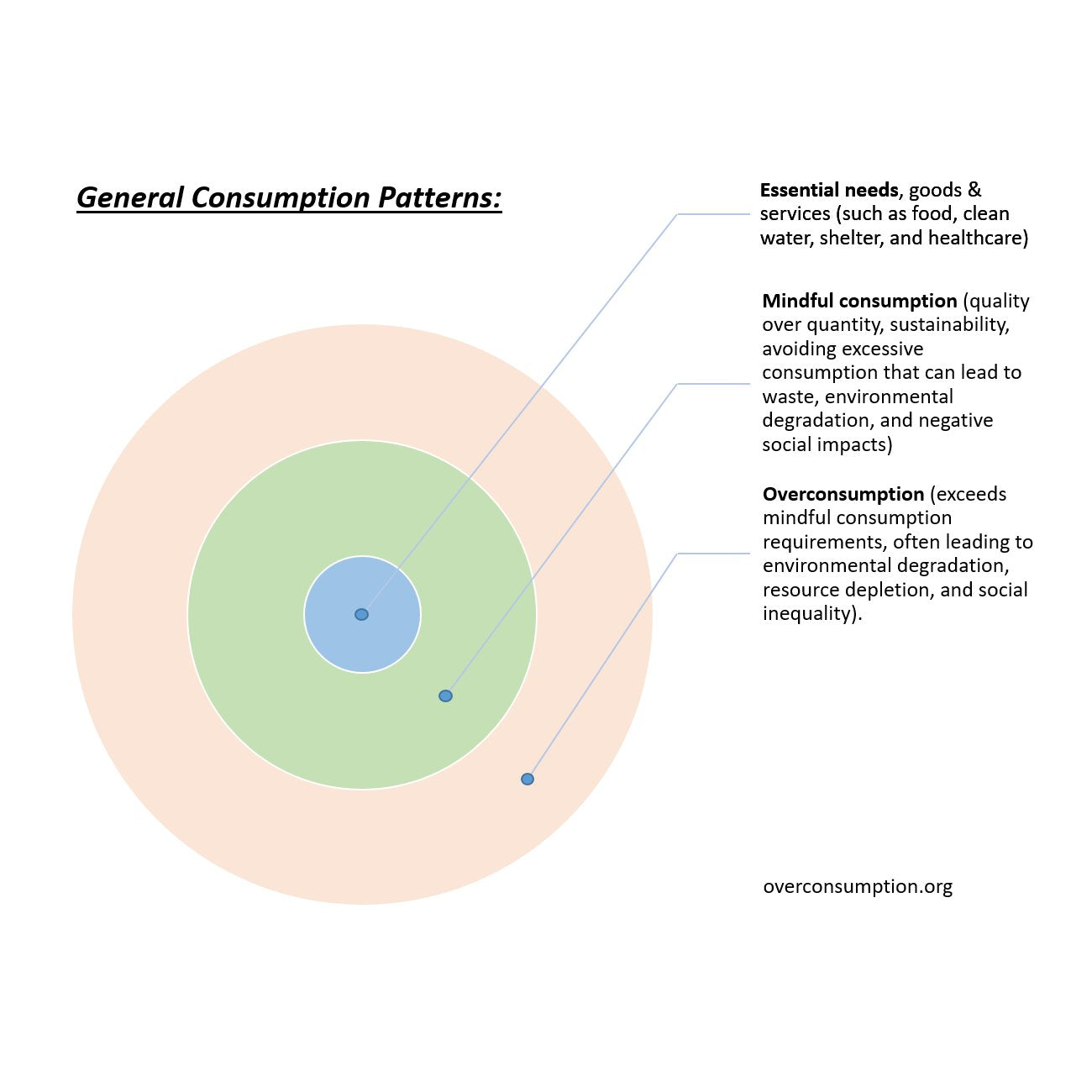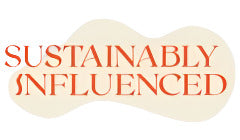
Break Free From Overconsumption
Join thousands reducing waste, saving money, and building sustainable communities
What Is Overconsumption and Why Is It Bad?
Overconsumption can be defined as consuming more than necessary. It poses a threat to the planet, depleting resources, promoting pollution, and climate change. Unsustainable habits lead to waste and dissatisfaction. By prioritizing our essential needs, sustainable products and ethical brands can help. Choose mindful consumption for a better future.

Rethinking Our Consumption Habits
Essential Needs vs. Overconsumption
As society evolves, so do our consumption patterns. Essential needs should be at the forefront, yet overconsumption often takes the wheel, driven by marketing and social pressures.
What Are Examples of Overconsumption?
Overconsumption is a pressing issue that manifests in various aspects of our daily lives. While these cases illustrate the broader implications of our consumption patterns, they are just a few among many that need to be addressed for a sustainable future:

Too much screen time isn’t just wasting your day — it’s rewiring your brain.
Digital & Social Media Overconsumption
Endless scrolling on TikTok, Instagram, and YouTube leads to anxiety, burnout, and low attention span. Digital overconsumption isn’t just a bad habit — it rewires your brain. Learn how to set healthy screen limits and protect your mental health.

Your closet shouldn’t cost the Earth.
Fashion & Beauty Overconsumption
Fast fashion creates over 92 million tons of waste every year. Cheap clothes and beauty products come at the cost of pollution and exploited workers. Choosing secondhand and sustainable options can change that.

Junk food is killing both our bodies and our planet.
Plastic, Food & Junk Consumption
Most junk food comes wrapped in single-use plastic that ends up in oceans — and even in our bodies. Ultra-processed snacks harm both our health and the planet. Small swaps can make a big difference.
Latest Articles
View all-
When Students Become Voices for Change: Erin M....
At Overconsumption.org, we believe that the next generation holds the power to shape more mindful, sustainable futures. Few examples embody this as clearly as the independent research project completed by Erin...
When Students Become Voices for Change: Erin M....
At Overconsumption.org, we believe that the next generation holds the power to shape more mindful, sustainable futures. Few examples embody this as clearly as the independent research project completed by Erin...
-
Cheap Goods: How Asia’s Export Boom is Fueling ...
In recent decades, the surge in inexpensive goods exported from Asia has profoundly transformed global consumer habits, economies, and environmental landscapes. Platforms like Shein, Temu, Alibaba, and others have made...
Cheap Goods: How Asia’s Export Boom is Fueling ...
In recent decades, the surge in inexpensive goods exported from Asia has profoundly transformed global consumer habits, economies, and environmental landscapes. Platforms like Shein, Temu, Alibaba, and others have made...
-
The Hidden Cost of Owning Too Much: How Overcon...
We live in a world where "more" is synonymous with success. Our homes bulge with gadgets we rarely use, closets overflow with clothes we never wear, and garages become graveyards...
The Hidden Cost of Owning Too Much: How Overcon...
We live in a world where "more" is synonymous with success. Our homes bulge with gadgets we rarely use, closets overflow with clothes we never wear, and garages become graveyards...
Must-Watch | "Buy Now! The Shopping Conspiracy," which explores the issues of overconsumption | Netflix documentary
Questions That May Arise About Overconsumption?
What is the main cause of overconsumption?
The biggest influence on overconsumption is often considered to be consumer culture, driven by a combination of advertising, social norms, and economic incentives. Specific factors include:
- Advertising and Marketing: Aggressive marketing strategies encourage consumers to purchase not just what they need, but also items that promise status, happiness, or convenience.
- Social Media and Peer Pressure: The portrayal of lifestyles and possessions on social media can create a desire to emulate those around us, leading to unnecessary purchases.
- Economic Factors: Consumerism is often incentivized by economic systems that prioritize growth and profit, leading to a cycle of production and consumption that encourages overconsumption.
- Psychological Factors: Impulse buying, the desire for instant gratification, and emotional spending contribute to overconsumption, as people often buy goods to satisfy emotional needs or boredom.
How overconsumption is killing the planet?
- Environmental Impact: It leads to increased resource depletion, waste generation, and pollution, contributing to climate change and the loss of biodiversity.
- Economic Inequality: Overconsumption often reflects existing inequalities, where the wealthy consume disproportionately more resources, affecting the availability for others.
- Health Concerns: Overconsumption can impact individual health, leading to issues such as obesity and mental health problems stemming from materialistic values.
- Sustainability: It challenges the ability of future generations to meet their needs, as natural resources become scarcer and ecosystems are damaged.
How to fight overconsumption?
Reducing overconsumption involves both individual and collective actions:
Individual Actions:
- Mindful Shopping: Before making a purchase, ask yourself if you truly need it and consider its long-term value and sustainability.
- Prioritize Quality Over Quantity: Invest in fewer, higher-quality items that last longer instead of frequently buying cheaper, low-quality products.
- Declutter and Reuse: Regularly evaluate your possessions, donate items you no longer need, and embrace second-hand shopping.
- Limit Impulse Purchases: Create rules for yourself, such as a waiting period before buying non-essential items, and avoid shopping when emotional.
Collective Actions:
- Advocate for Sustainable Practices: Support policies and businesses that prioritize sustainability and ethical production.
- Educate Others: Share information about the consequences of overconsumption and promote conscious consumerism in your community.
- Support Local Economies: Choose to shop at local businesses, farmers' markets, and cooperatives that prioritize sustainable practices.
- Participate in Community Initiatives: Join or support organizations that focus on sustainability, recycling, and reducing waste in your community.
- By adopting these strategies, individuals and communities can work together to mitigate overconsumption and promote a more sustainable way of living.
Why do people overconsume?
Overconsumption can be attributed to a variety of psychological, social, economic, and environmental factors. Here are some of the main reasons why people may
overconsume in different areas, such as purchases, goods, food, and money spending:
- Many people use shopping or eating as a way to cope with stress, anxiety, or depression. This can lead to impulsive purchases or overeating as a means of temporary relief.
- Peer pressure, social media, and advertising can create norms around consumption. People often feel compelled to keep up with others, leading to overconsumption in order to fit in or gain approval.
- The desire for immediate pleasure can drive individuals to make quick, often impulsive decisions that result in overconsumption. This is particularly true in a consumer culture that emphasizes instant gratification.
- Companies use persuasive advertising techniques to create desires for their products, often leading to unnecessary purchases. Strategies such as sales promotions, scarcity, and appeal to emotions encourage consumers to buy more.
- The availability of goods and services, especially online shopping, makes it easier for individuals to indulge in overconsumption. Impulse purchases may occur due to easy access and convenience.
- Consumption is sometimes tied to identity, where people believe that possessing certain goods enhances their status or self-image. This need for validation can lead to overconsumption as individuals try to project a specific image.
- Perceptions of economic stability or abundance can also contribute to overconsumption. People may spend more during times of perceived economic prosperity, believing they can
afford it. - FOMO is a common phenomenon where individuals feel they need to participate in trends or events, leading to increased spending on goods or experiences that they
might not truly need. - A limited understanding of budgeting, saving, and responsible spending can lead to overspending and poor financial decisions, resulting in overconsumption of resources.
- In some cultures, overconsumption is normalized or even celebrated, reinforcing behaviors that prioritize consumption over moderation.
- Some individuals may find themselves consuming out of boredom or as a way to fill a void in their lives, leading to excessive purchasing or eating habits.
- Understanding these factors can help in addressing overconsumption and making more mindful choices about purchases, food, and spending.
Overconsumption.org | Our Recognition
Why to Join Overconsumption Movement?
-
Environmental Impact
By reducing overconsumption, individuals can significantly lessen their carbon footprint and decrease waste. This movement advocates for sustainable practices that contribute to the health of the planet, promoting cleaner air, water, and a reduction in resource depletion.
-
Financial Savings
Overconsumption often leads to unnecessary spending. By adopting a more mindful consumption approach, individuals can save money by prioritizing needs over wants, making more thoughtful purchases, and reducing impulse buying.
-
Community Connection
Being part of a movement fosters a sense of belonging and community. It connects like-minded individuals who share similar values and goals, providing a platform for sharing experiences, resources, and encouragement to maintain sustainable practices.
What changes are you making to reduce overconsumption? Share your thoughts below!
Invest in a Smarter, More Sustainable Future
Your donation funds education programs that equip young people with real tools to reduce waste before it starts — from campus workshops to community initiatives. 100% of your contribution goes directly to student-led sustainability projects.
Want to sponsor a full workshop or partner as a company? Get in touch
Trusted by 25,000+ annual visitors and supported by students, educators, and sustainability leaders.























